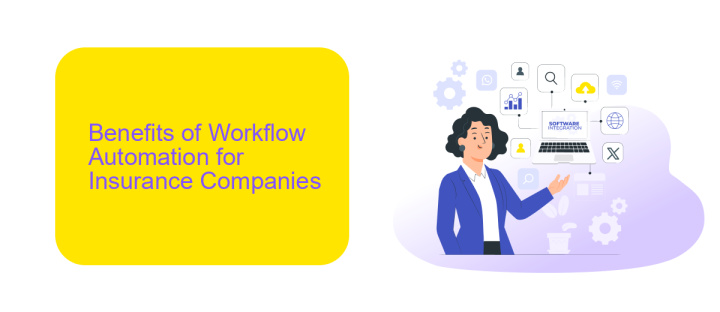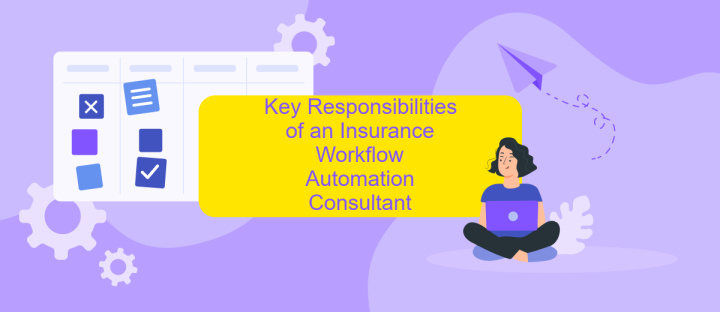Workflow Automation Consultant for Insurance
In the fast-paced world of insurance, efficiency and precision are paramount. A Workflow Automation Consultant specializes in streamlining processes, reducing manual tasks, and enhancing productivity. By leveraging advanced automation tools, they help insurance companies minimize errors, accelerate claims processing, and improve customer satisfaction. Discover how a Workflow Automation Consultant can transform your insurance operations, making them more agile and competitive.
What is Workflow Automation in Insurance?
Workflow automation in insurance involves the use of technology to streamline and optimize various processes within an insurance company. It aims to reduce manual tasks, minimize errors, and improve overall efficiency. By automating repetitive tasks, insurance companies can focus more on customer service and strategic initiatives.
- Policy management: Automating policy issuance, renewals, and cancellations.
- Claims processing: Streamlining the claims submission, evaluation, and approval process.
- Customer service: Automating responses to common customer inquiries and requests.
- Compliance: Ensuring adherence to regulatory requirements through automated checks and balances.
Tools like ApiX-Drive facilitate workflow automation by enabling seamless integration between different software systems. This integration allows for real-time data exchange and process synchronization, further enhancing the efficiency of insurance operations. By leveraging such tools, insurance companies can achieve greater agility and responsiveness in their workflows.
Benefits of Workflow Automation for Insurance Companies

Workflow automation offers significant benefits to insurance companies by streamlining processes and reducing manual intervention. By automating repetitive tasks, such as data entry and claims processing, companies can improve efficiency and accuracy, leading to faster turnaround times and enhanced customer satisfaction. Automation also minimizes the risk of human error, ensuring compliance with regulatory standards and reducing operational costs.
Moreover, integrating various systems and applications through services like ApiX-Drive allows insurance companies to create a seamless workflow. ApiX-Drive enables easy integration of CRM, email marketing, and other essential tools, facilitating real-time data synchronization and better decision-making. This holistic approach not only optimizes internal processes but also provides valuable insights into customer behavior, helping companies to tailor their services and improve overall business performance.
Key Responsibilities of an Insurance Workflow Automation Consultant

An Insurance Workflow Automation Consultant plays a crucial role in streamlining and optimizing processes within the insurance industry. Their expertise ensures that insurance companies can operate more efficiently, reduce manual errors, and improve customer satisfaction.
- Analyze existing workflows to identify inefficiencies and areas for improvement.
- Design and implement automation solutions tailored to the specific needs of the insurance company.
- Integrate various software systems and platforms, utilizing services like ApiX-Drive to ensure seamless data flow between applications.
- Provide training and support to staff on new automated processes and systems.
- Monitor and evaluate the performance of automated workflows, making adjustments as necessary to enhance efficiency.
- Stay updated with the latest trends and technologies in workflow automation to continually improve processes.
- Collaborate with different departments to ensure that automation solutions align with overall business objectives.
By leveraging their skills and tools such as ApiX-Drive, Insurance Workflow Automation Consultants help insurance companies to stay competitive in a rapidly evolving market. Their work not only enhances operational efficiency but also contributes to better customer experiences and overall business growth.
How to Become an Insurance Workflow Automation Consultant

Becoming an insurance workflow automation consultant requires a blend of industry knowledge and technical expertise. Start by gaining a deep understanding of insurance processes, policies, and regulatory requirements. This foundational knowledge is crucial for identifying areas where automation can streamline operations.
Next, build your technical skills by learning about workflow automation tools and software. Familiarize yourself with platforms like ApiX-Drive, which facilitate seamless integration between various systems and services. Understanding how to configure and manage these tools is essential for creating efficient automated workflows.
- Obtain relevant certifications in workflow automation and insurance.
- Gain hands-on experience through internships or entry-level positions in the insurance industry.
- Stay updated on the latest trends and technologies in automation and insurance.
- Develop strong analytical and problem-solving skills to identify and address workflow inefficiencies.
Networking is also key; join professional associations and attend industry conferences to connect with other professionals. Building a strong professional network can provide valuable insights and opportunities. With the right combination of knowledge, skills, and connections, you can establish yourself as a successful insurance workflow automation consultant.
In-Demand Skills for Insurance Workflow Automation Consultants
Insurance workflow automation consultants must possess a diverse set of skills to effectively streamline processes and enhance operational efficiency. Key skills include a strong understanding of insurance industry regulations and compliance requirements, as well as expertise in business process management (BPM). Familiarity with robotic process automation (RPA) tools and software is essential for automating repetitive tasks and reducing manual intervention. Additionally, proficiency in data analysis and reporting is crucial for identifying bottlenecks and measuring the success of automation initiatives.
Technical aptitude is also vital, particularly in configuring and integrating various software solutions. Knowledge of integration platforms like ApiX-Drive can be particularly beneficial, as it simplifies the process of connecting different applications and services. Effective communication and project management skills are necessary to collaborate with stakeholders and ensure smooth implementation of automation projects. Finally, a proactive approach to staying updated with the latest industry trends and technological advancements will enable consultants to provide innovative solutions that drive continuous improvement.
FAQ
What is workflow automation in the insurance industry?
How can a Workflow Automation Consultant help an insurance company?
What are the benefits of automating insurance workflows?
What kinds of tasks can be automated in an insurance company?
What tools are commonly used for workflow automation in insurance?
Strive to take your business to the next level, achieve your goals faster and more efficiently? Apix-Drive is your reliable assistant for these tasks. An online service and application connector will help you automate key business processes and get rid of the routine. You and your employees will free up time for important core tasks. Try Apix-Drive features for free to see the effectiveness of the online connector for yourself.

